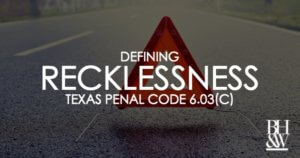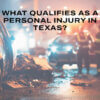Defining “Recklessness” Under the Texas Penal Code
 There are some criminal offenses that require the state the prove that the defendant acted “recklessly” or with “criminal recklessness.” In a colloquial sense, we (including prosecutors) often think of recklessness as another word for carelessness, but it actually has a specific definition in the Texas Penal Code.
There are some criminal offenses that require the state the prove that the defendant acted “recklessly” or with “criminal recklessness.” In a colloquial sense, we (including prosecutors) often think of recklessness as another word for carelessness, but it actually has a specific definition in the Texas Penal Code.
Defining “Recklessness,” Tex. Penal Code Section 6.03(c) states that “a person acts recklessly, or is reckless, with respect to circumstances surrounding his conduct or the result of his conduct when he is aware of but consciously disregards a substantial and unjustifiable risk that the circumstances exist, or the result will occur. The risk must be of such a nature and degree that its disregard constitutes a gross deviation from the standard of care that an ordinary person would exercise under all the circumstances as viewed from the actor’s standpoint.”
What Does the Texas Court of Criminal Appeals Say About Recklessness?
Unpacking the legal standard of recklessness, The Texas Court of Criminal Appeals reasons that…
“Criminal recklessness must not be confused with (or blended into) criminal negligence, a lesser culpable mental state.” Williams v. State, 235 S.W.3d 742, 751 (Tex. Crim. App. 2007). “Criminal negligence depends upon a morally blameworthy failure to appreciate a substantial and unjustifiable risk while recklessness depends upon a more serious moral blameworthiness – the actual disregard of a known substantial and unjustifiable risk.” Id.
Criminal negligence and recklessness differ from one another only in terms of mental state:
- Criminally negligent defendant “ought to be aware” of a substantial and unjustifiable risk;
- Reckless defendant is subjectively aware of an identical risk but disregards it
The two prongs of gross negligence or recklessness are:
- Subjectively, the defendant must have actual awareness of the extreme risk created by his or her conduct.
- Objectively, the defendant’s conduct must involve an extreme degree of risk (the “extreme risk” prong is not satisfied by a remote possibility of injury or high probability of minor harm, but the likelihood of serious injury to the plaintiff).
Reckless conduct…
- Is the conscious disregard of the risk created by the actor’s conduct;
- Mere lack of foresight, stupidity, irresponsibility, thoughtlessness, ordinary carelessness, however, serious the consequences may be, do not suffice to constitute criminal recklessness;
- Criminal recklessness is of a gross and flagrant character, evincing reckless disregard of human life, or of the safety of persons exposed to its dangerous effects; or that entire want of care which would raise the presumption of a conscious indifference to consequences; or which shows such wantonness or recklessness or a grossly careless disregard of the safety and welfare of the public, or that reckless indifference to the rights of others, which is equivalent to an intentional violation of them.
Recklessness: Texas Case Law Examples
Williams v. State, 235 S.W.3d 742 (Tex. Crim. App. 2007): The defendant was convicted after her children died in an accidental house fire while her boyfriend was babysitting. The defendant took the children to a house without working utilities and left them under her boyfriend’s care with a candle lit in their bedroom. The court held that there was legally insufficient evidence that defendant consciously disregarded a substantial and unjustifiable risk that the children would suffer serious bodily injury in a house fire. The court also said that the defendant’s stupidity did not constitute reckless disregard. The defendant was not criminally responsible for the result
Mills v. State, 742 S.W.2d 831, 1987 Tex. App. LEXIS 9214 (Tex. App. Dallas Dec. 18. 1987, no writ): The defendant’s conviction was upheld where circumstantial evidence supported the conclusion that defendant placed a child in a tub of hot water. The Court found that the jury could reasonably have found defendant acted recklessly with regard to that child’s care in violation of Tex. Penal Code § 6.03(c).
Ehrhardt v. State, No. 06-02-00208-CR, 2003 Tex. App. LEXIS 7248 (Tex. App. Texarkana Aug. 26, 2003): Where the evidence in an assault trial showed defendant struck the victim in the face, the court found that the defendant was reckless as to whether her conduct would result in bodily injury.










